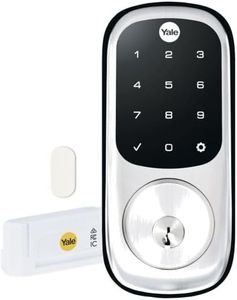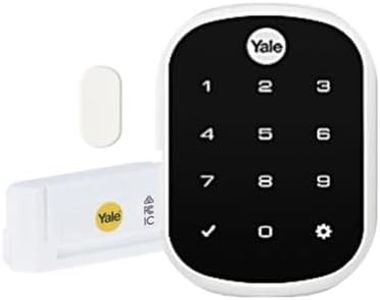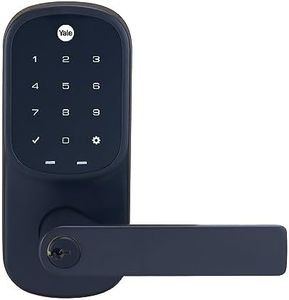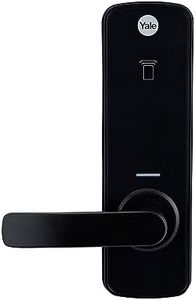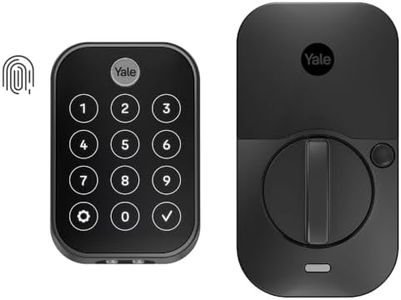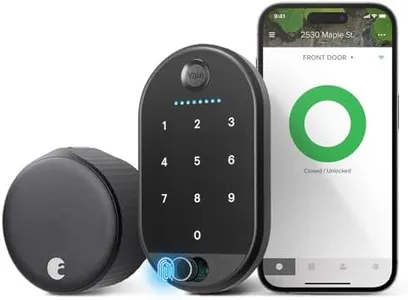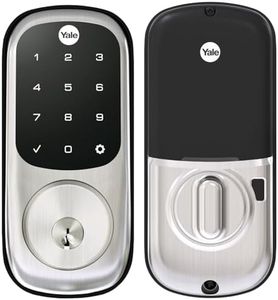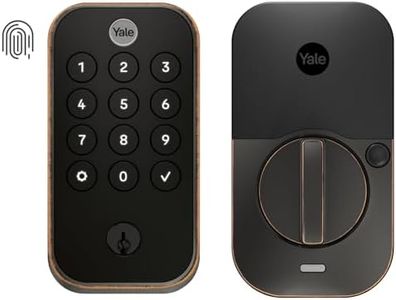We Use CookiesWe use cookies to enhance the security, performance,
functionality and for analytical and promotional activities. By continuing to browse this site you
are agreeing to our privacy policy
9 Best Yale Smart Locks
From leading brands and best sellers available on the web.By clicking on a link to a third party's website, log data is shared with that third party.
Buying Guide for the Best Yale Smart Locks
Choosing a Yale smart lock can really boost your home security and convenience. With several types and features available, it's helpful to understand the basics so you pick a lock that fits your needs and lifestyle. Consider where you'll install the lock, how you want to interact with it, and what extra features matter most for your household. By breaking down the key specs, you’ll have a clearer sense of what to look for and how to align those features with your daily routine.Lock Type (Deadbolt vs. Lever Lock)Smart locks from Yale generally come in two main types: deadbolts and lever locks. Deadbolts are most common for front or outside doors where a higher level of security is a priority, while lever locks are often used for interior doors. If your primary need is to secure an external entry, a deadbolt model is usually best. For convenience on internal doors, a lever lock may be suitable. Start by checking the type of door you need the lock for and match the lock mechanism accordingly.
Connectivity (Bluetooth, Wi-Fi, Z-Wave, Zigbee)Connectivity refers to how your lock talks to your phone or other smart devices. Bluetooth-only models usually connect directly to a phone within short range, which is good for basic app access. Models with Wi-Fi (built-in or via a bridge) allow remote access and integration with voice assistants or home automation, which is useful if you want to lock or unlock from anywhere. Z-Wave and Zigbee connect to broader smart home systems, ideal for users with smart home hubs. Choose connectivity based on your need for remote control and smart home integration.
Access Methods (Keypad, App, Physical Key, RFID, Biometric)Access methods are how you unlock your smart lock. Common options are entering a code on a keypad, using a mobile app, swiping an RFID card, or using a traditional physical key. Some locks offer multiple methods for flexibility. If you have children or guests, keypad entry can be convenient since codes can be shared and changed easily. App-controlled locks are handy if you like to manage access and check lock status from your phone. Consider which method best fits your household’s habits and how much flexibility or backup access you might need.
Power Source and Battery LifeMost Yale smart locks operate on batteries, so battery life is important to consider. Battery life can range from a few months to over a year, depending on usage and features. Longer battery life means less frequent maintenance, while models with good battery indicators ensure you’re not caught off guard. Look for models that offer clear low-battery alerts and consider how easy it is to change batteries on the lock you choose, especially if it's on a door you use often.
Security Features (Auto-Lock, Tamper Alerts, Security Certifications)Security features are crucial for peace of mind. Auto-lock ensures the door secures itself after a set time, which is helpful if you often forget to lock up. Tamper alerts notify you if someone tries to compromise the lock. Security certifications indicate the lock meets established standards for resistance to picking and forced entry. Prioritize these features if your main concern is safety or if your home is in a high-traffic area.
Installation RequirementsSome Yale smart locks are designed for easy DIY installation and can fit on most standard doors without the need for special tools. Others may require a bit more technical know-how or even professional installation if your door is a non-standard size or material. Before purchasing, check the compatibility with your current door hardware and how comfortable you are with installing it yourself.
